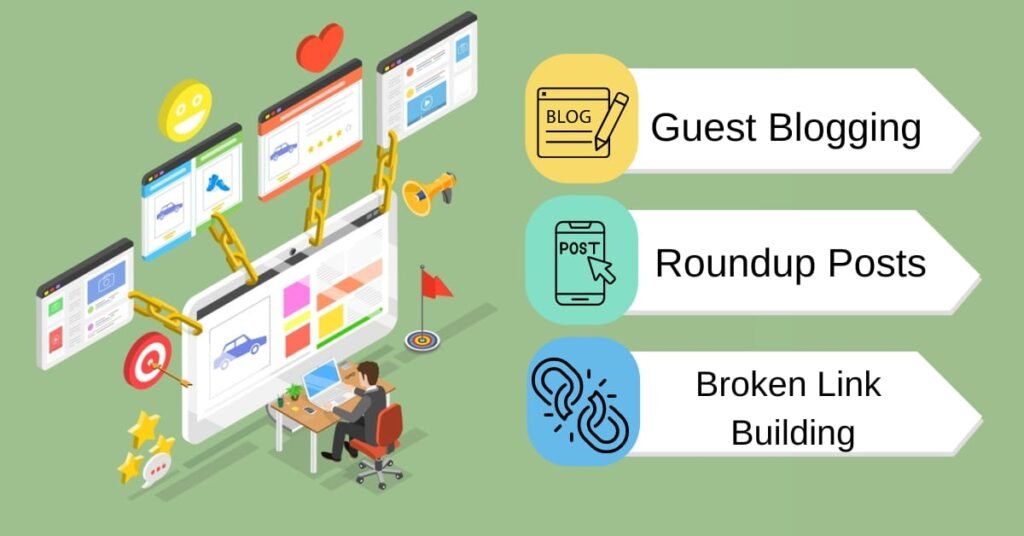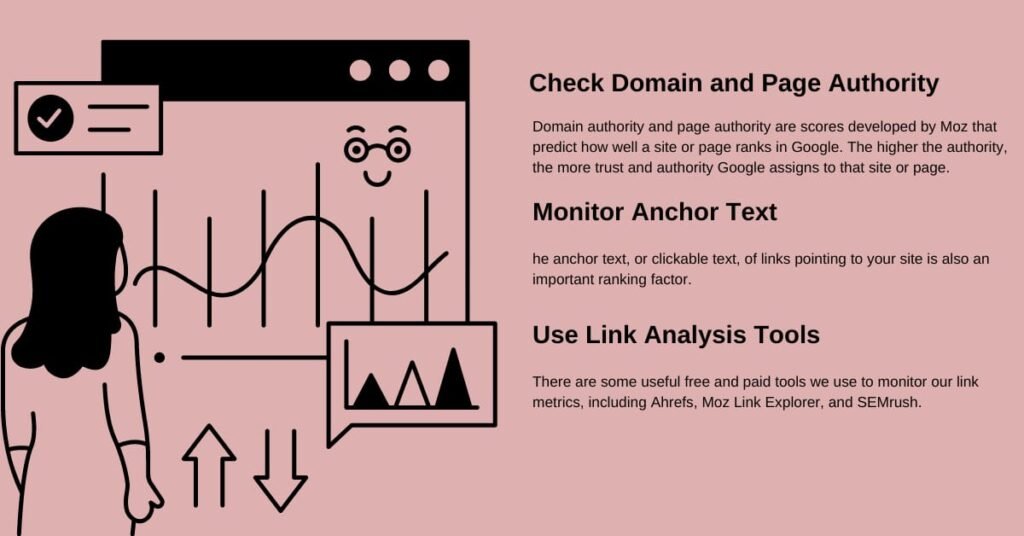As SEO pros, we know that ranking high in search engines is crucial. But chasing rankings can feel like an endless game of catch-up if you only focus on on-page optimization. The truth is, off-page SEO techniques are just as important. Off-page factors make up a huge portion of Google’s algorithm and can have an enormous impact on your rankings.
What Is Off-Page SEO and Why Off-Page SEO Techniques Matter
Off-page SEO refers to factors outside of your website that influence how Google ranks your pages in search results. As SEO experts, we know off-page optimization is just as important as on-page SEO. Here are the top techniques we use to improve our clients’ rankings:
1. Build high-quality backlinks. The more authoritative sites that link to yours, the better. Aim for relevant anchor text and natural-looking links from sites with a high domain authority.
2. Increase brand mentions. Getting your brand name, product names, and important keywords mentioned on other sites builds brand awareness and gives you a rankings boost. Guest blogging, press releases, and influencer collaborations are great for this.
3. Improve your social shares. When content gets a lot of shares on social media, especially Facebook and Twitter, it signals to Google that the content is interesting and valuable. Run social media contests and promotions to increase shares.
4. Build local citations. For local businesses, get listed in as many local directories as possible. This includes directories like Yelp, Facebook, Bing Places, and Google My Business. The more places you’re listed, the more authoritative you seem in local search.
5. Earn high-quality reviews. Positive reviews on sites like Yelp, Google, and Facebook establish you as a reputable business in the eyes of customers and search engines. Respond to both positive and negative reviews in a timely, professional manner.
6. Optimize your profiles. Fill out profiles on sites like Facebook, Twitter, LinkedIn, AngelList, Crunchbase, and Quora. Include your important keywords, a brief description of your business, and links pointing back to your site.
7. Increase your domain authority. The higher your domain authority, the more weight Google gives to your backlinks and rankings. Build a reputable brand by publishing high-quality content, earning media mentions, building social shares, and gaining backlinks over time.
Backlink Quality Over Quantity – Prioritize Relevant, Trusted Sites
We know backlinks are one of the most important ranking factors, but it’s really the quality of those links that matter most to Google. As SEO professionals, we focus on building high-quality backlinks from authoritative, trusted sites in our industry to help our clients rank higher in search results.
Some of the ways we build impactful backlinks include:
· Guest blogging on industry-leading sites. We pitch relevant, well-written guest posts to sites our target audience already reads and trusts.
· Leveraging influencer outreach. We connect with influential people in our client’s industry and provide them with resources or data they can link to. These influencer links carry more weight with Google.
· Focusing on niche directories and resource pages. We aim for selective directories, not massive link farms. We look for directories highly relevant to our client’s industry and area of expertise. These provide context for Google about our client’s business.
· Pursuing co-citation from authoritative sources. We analyze competitors’ backlink profiles to find respected industry sources frequently linking to them. We then develop relationships and pitch those sites to link to our content as well, establishing our client as an authority.
· Commenting on relevant industry forums and blogs. We engage with our target audience by posting helpful comments on their preferred blogs and forums. Some site owners will link back to commenters they find valuable, passing link juice.
· Promoting content on social media. We share our client’s blog posts, data studies, videos, and other resources on relevant social networks. While social shares themselves don’t directly impact search rank, they can lead to natural backlinks that do.
By taking the time to build a targeted, high-quality backlink profile, we’re able to organically improve our clients’ authority and rankings over the long run. Quality over quantity is the name of the game!
Link Building Techniques – Guest Posts, Roundups, Broken Links

When it comes to off-page SEO, link building is one of the most important techniques we have in our arsenal. Here are some of our favorite ways to build high-quality backlinks:
Guest Blogging
Guest blogging on industry websites is a great way for us to build backlinks and increase our domain authority. We reach out to sites in our niche and offer to write a blog post for them. In exchange, they give us a backlink from the post back to our site. We aim for sites that have a high domain authority and lots of organic search traffic. The key is finding a good match between what we want to write about and what their audience will find valuable.
Roundup Posts
Roundup posts are a creative way for us to build backlinks. We contact influencers in our industry and ask them to contribute a few sentences on a topic for a big roundup post on our blog. In exchange, we give them a backlink. Because lots of experts are involved, these posts tend to rank really well and generate great backlinks for us. Roundups also introduce our content to new audiences and help build connections with industry influencers.
Broken Link Building
Broken link building involves finding broken links on other websites that lead to deleted content. We then reach out to the webmaster and offer to replace that content with one of our existing blog posts or resources. If they agree, they’ll replace the broken link with a link to our site — giving us a valuable backlink. This does require a large volume of outreach to be effective, but can result in high-quality, authoritative backlinks.
Link Reclamation
Link reclamation is similar to broken link building. We search for websites that previously linked to our content but have since removed the link. We then contact the webmaster and politely ask them to restore the link, citing its value to their readers. Many webmasters will happily restore a high-quality, relevant link, allowing us to reclaim a previously lost backlink. This helps combat link decay and boost our rankings over time.
With consistent effort and outreach, these link building techniques allow us to build a diverse backlink profile and improve our search rankings. While link building can be tedious, focusing on relationship-building and creating truly valuable resources makes the process meaningful and impactful.
Local SEO – Google My Business, Citations, Reviews
We all know how important off-page SEO techniques are for ranking higher in Google. As SEO experts, we’ve put together an off-page SEO checklist to help you strengthen your link building and local SEO strategies.
Google My Business
Claiming and optimizing your Google My Business listing should be at the top of your local SEO to-do list. Make sure your business name, address, and phone number are correct and consistent across the web. Upload some high-quality photos of your business, employees, products, and location. Post regular updates and offers to engage your customers and keep your listing active. Encourage happy clients to leave you a glowing review Google loves lots of positive reviews!
Citations
Citations refer to mentions of your business name, address, and phone number on other websites and directories. The more citations you have, the more authority your local SEO carries. Focus on listings on reputable local directories like Yelp, Facebook, Bing, and Yahoo. Double check that all information is accurate and consistent. The more complete your listings are, the better.
Reviews
Customer reviews are social proof that you run a reputable business. Aim for at least 10 to 15 reviews on sites like Google, Facebook, and Yelp. Respond to both positive and negative reviews in a prompt, professional manner. Thank your happy clients for the kind words. For critical reviews, apologize and let the customer know you will address their concerns. Reviews give you valuable feedback and boost your local SEO at the same time.
Link Building
Link building is an important part of any off-page SEO strategy. Focus on earning high-quality backlinks from authoritative, trustworthy websites in your industry and location. Guest blogging, business profile links, and sponsorships are all great ways to build local links. Make sure any links you build use your target keywords and location in the anchor text for maximum SEO benefit.
By focusing on these key areas of local SEO, we’ve been able to rank higher in Google maps and drive more foot traffic to our brick-and-mortar locations. We hope this checklist gives you some actionable tips to start strengthening your own local search presence. Let us know if you have any other questions about off-page SEO!
Promote Content – Outreach, Paid Ads, Email Marketing
Promoting your content is key to improving its rankings and visibility. We have a few techniques in our off-page SEO toolkit to get the word out.
Outreach
Personalized outreach to influencers and media contacts in your industry is highly effective. Email relevant bloggers, podcasters, and journalists to pitch your content for coverage or backlinks. Be authentic and highlight why your content would benefit their audience.
Paid Ads
Using paid ads to promote your content, especially new pieces, can drive significant traffic and boost rankings. We often use Google Ads and social media ads on Facebook, LinkedIn, and Twitter to promote our latest guides and blog posts. Even a small ad budget can go a long way.
Email Marketing
Donate underestimate the power of email marketing. Promote your new content to your email subscribers and encourage them to share and link to it. We include content teasers and links in our regular newsletter and also send dedicated content promotion emails for our most link-worthy pieces.
Social Media
Leverage your social media followers by sharing and promoting your content on platforms like Facebook, LinkedIn, Twitter, and Reddit. Post updates, start discussions, and engage with those who comment and share. Also, don’t forget to tag any influencers or brands mentioned in the content. Social shares and engagements signal to search engines that your content is valuable.
Forums and Groups
Share your content in relevant online forums, Facebook groups, Slack channels, and LinkedIn groups. Look for places where your target audience actively participates and start discussions around your content or ask for feedback. Be an active member of the community by also commenting on and sharing other posts.
Promoting your content through multiple channels is the key to maximizing its reach and boosting rankings. While outreach and social sharing are free, paid ads and email marketing do require an investment of time and money but can drive a high ROI if done well. Focus on the techniques that best match your content and audience, and keep optimizing and improving your efforts over time.
Monitor Link Metrics – Check Domain/Page Authority, Anchor Text

As SEO experts, we know that off-page optimization is just as important as on-page factors for ranking higher in search engines. One of the most important off-page metrics we monitor is link authority and anchor text.
Check Domain and Page Authority
Domain authority and page authority are scores developed by Moz that predict how well a site or page ranks in Google. The higher the authority, the more trust and authority Google assigns to that site or page. We regularly check the domain and page authority of sites linking to our important pages. Over time, we aim to increase the authority of sites linking to us. Some ways we do this include:
· Guest blogging on high-authority sites in our niche and including a link back to our site in the author bio.
· Reaching out to sites with high DA and PA and offering to provide them with a quality guest blog post in exchange for a link.
· Building relationships with influencers and authoritative sites through social media and email outreach. Once a relationship is established, you can explore link exchange or guest blogging opportunities.
Monitor Anchor Text
The anchor text, or clickable text, of links pointing to your site is also an important ranking factor. We track the anchor text of links to ensure we have a good mix of anchor text variations, including our target keywords, branded terms, and generic terms like “click here”. Having too many links with the exact same anchor text can be a signal to Google that you are manipulatively building links. We aim for a natural mix of anchor text in links to our important pages.
Use Link Analysis Tools
There are some useful free and paid tools we use to monitor our link metrics, including Ahrefs, Moz Link Explorer, and SEMrush. These tools allow us to see important data like which sites are linking to us, the anchor text of those links, domain and page authority of linking sites, and how our link metrics change over time. By regularly checking our link data with these tools, we can make sure we stay on track with our link building goals and strategies.
Monitoring link authority, anchor text, and other link metrics is an ongoing process that requires consistency to be effective. But by making link analysis a habit, we’ve found our rankings and traffic steadily improve over the long run.
Off-Page SEO Checklist Template – Track Progress and Results
As SEO experts, we know that off-page optimization is just as important as on-page SEO. To rank higher in search engines, we need to focus on building quality backlinks and brand mentions from other authoritative websites.

Here’s our off-page SEO techniques checklist to track our progress:
Blog Outreach
We regularly pitch guest posts to industry blogs and media outlets. So far this year we’ve published 27 guest posts on sites like Moz, Search Engine Journal, and Social Media Examiner.
Broken Link Building
We use tools like Ahrefs and Majestic to find high-authority websites with broken links, then pitch them with replacement content. This has netted us 63 high-quality backlinks to date.
Digital PR
Our PR team sends press releases to over 900 journalists and media contacts. We’ve been featured in Entrepreneur, Forbes, and Inc. Magazine, gaining valuable backlinks and brand exposure.
Social Bookmarking
We actively build backlinks by bookmarking our content on sites like Reddit, StumbleUpon, and Delicious. We have over 2,500 social bookmarks from a variety of high-authority sites.
Forum Posting
Our experts actively participate in industry forums like Warrior Forum, Digital Point, and Moz Q&A. We’ve made over 850 forum posts this year, many containing backlinks to our site.
Competitor Backlink Analysis
We regularly analyze competitors backlinks using Ahrefs to find link building opportunities. We’ve discovered 4,723 unique domains linking to competitors that we’re now pitching for backlinks.
Influencer Outreach
We connect with industry influencers on social media and via email to build relationships. So far, 73 influencers have linked or referred to our content, amplifying our brand reach.
Directories
We’ve submitted our website to over 650 directories like Clutch, GoodFirms, and TopSEOs to build high-quality backlinks and increase referral traffic.
Tracking our ongoing off-page SEO efforts with this checklist helps ensure we’re making progress and achieving results. Consistently building backlinks and brand mentions from authoritative websites is key to improving our search rankings and organic traffic over time.
Conclusion
We’ve covered some of the most important off-page SEO techniques you need to be using to rank higher in search engines. While technical on-page optimization is important, off-page SEO strategies are where the real ranking power comes from. By building high-quality backlinks, increasing your social media shares, optimizing your content for social media, guest blogging, and implementing an outreach campaign, you’ll be well on your way to dominating the SERPs.
Staying on top of the latest SEO trends and algorithms is key. But with the techniques we’ve discussed, you’ll have a solid SEO strategy to get your content in front of more eyeballs and send more traffic to your site. Time to stop reading about it and start implementing an off-page SEO campaign of your own!


0 Comments